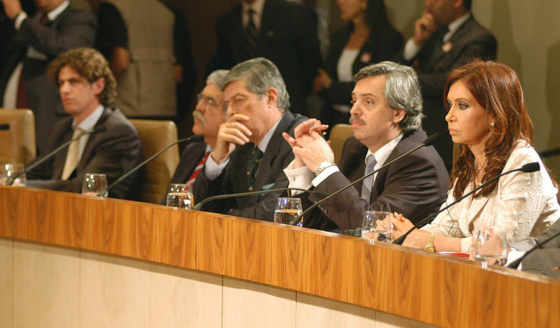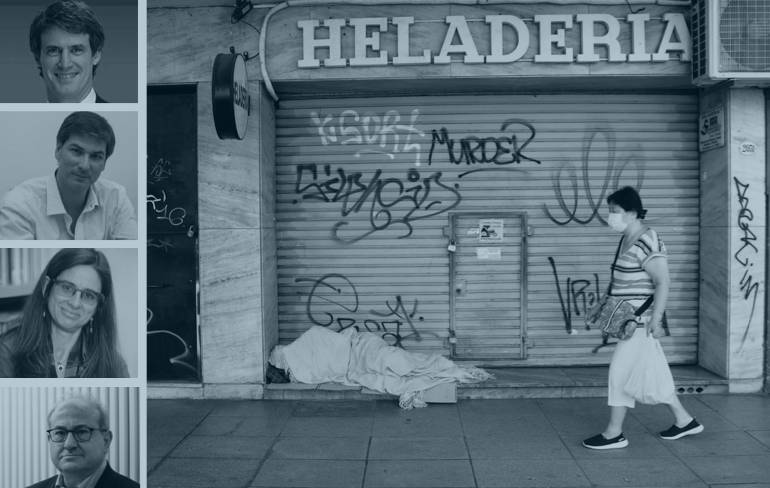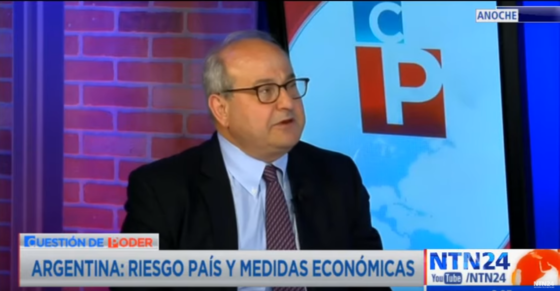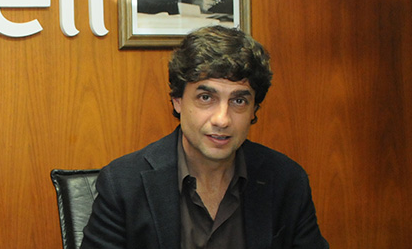
What Argentina Could Expect from Alberto Fernández
More than ideology, Fernández’s pragmatism offers clues to how he’d govern.
On June 1, 2020, the Inter-American Dialogue hosted “Argentina: Between Covid-19 and Default,” a webinar featuring Maria Victoria Murillo, director of the Institute of Latin American Studies at Colombia University, Alfonso Prat-Gay, former minister of the Treasury and former president of the Central Bank of Argentina, and Rodrigo Zarazaga, director of the Center for Research and Social Action (CIAS). Michael Shifter, president of the Inter-American Dialogue, moderated the event. The discussion focused on the political, economic, and social dimensions of the current situation in Argentina as the country has found itself in the middle of both a global pandemic and a massive debt negotiation.
Maria Victoria Murillo began the discussion by highlighting two long-term features of Argentinian democracy: voting behavior tends to be driven by the economy, and a historic polarization of voters exists around Peronism. In 2019, widespread social discontent swept the region, and Argentina was suffering from its second year of recession. In true Argentinian fashion, voters rejected the incumbent president, Mauricio Macri, due to the economic downturn the country had experienced during his term. His successor, Alberto Fernández, received a clear mandate to focus on economic recovery and restructure the country’s foreign debt. During his first few months in office, Fernández undertook a recalculation of the pension system, initiated a discussion on judicial reform, and took steps towards his campaign promise of abortion legalization. However, at the beginning of 2020, his government put everything on pause to tackle debt negotiation, which they claimed would be solved by the end of March. Lamentably, this plan went awry due to the outbreak of Covid-19 in mid-March. Unlike his Mexican and Brazilian counterparts, Fernández quickly applied social distancing and quarantine orders to the entire country. He enacted these measures with support from Horacio Rodríguez Larreta, mayor of Buenos Aires, and member of the opposition party. Although this bipartisan action boosted Fernández’s popularity and allowed him to achieve a high level of compliance, both the poor and the middle class have become increasingly dependent on the state due to the strict orders that prevent them from earning an income.
In response to this plight of dependence, Alfonso Prat-Gay asserted, “As an economic policy instrument, lockdowns are very regressive…[especially] in countries such as ours in Latin America where the informal sector is north of 30, even 40 percent of GDP.” Since most informal sector workers live off of a daily income, asking them to stay at home is tantamount to asking them not to eat. Although the government has increased social welfare spending, Prat-Gay believes that it is not being delivered nearly as quickly or extensively as one would hope. 75 percent of small and medium-sized companies have yet to receive support from the state, and emergency income has not yet reached 3 million of the 9 million informal sector workers in the country. In comparison to the $200 billion worth of social programs that the US has put in place since March, Argentina has only put $1 billion towards socioeconomic alleviation. Furthermore, Prat-Gay urged the federal government to take further action with respect to bank guarantees, fiscal alleviation, and aid to provincial and municipal governments. With regard to the country’s debt negotiation, he spoke to the government’s new offer in which they have agreed to pay down the coupons that have already matured and to reduce the grace period by two years in order to begin paying bonds by 2022. While this is a step in the right direction, the proposal is on the verge of not meeting the parameters that the IMF set forth in its technical note. However, Argentina still has until June 12 to fine-tune their proposal and negotiate with creditors.
Returning to Prat-Gay’s commentary on the regressive nature of lockdowns, Rodrigo Zarazaga argued that the pandemic and ensuing lockdown brought to light the major social problems that Argentina possesses. While it has been proven that the most powerful weapon we have to stop the virus is social distancing, “social distancing is regretfully not very feasible in the shantytowns and poorer neighborhoods. Overcrowded conditions, lack of public services, precarious health systems, and food shortages, among other factors, make social distancing almost an impossible mission in the shantytowns.” Moreover, the lockdown highlights the lack of state capabilities in poorer neighborhoods. While the advertisements from the Ministry of Health advise frequent handwashing, less than 10 percent of households in the shantytowns have consistent access to freshwater supply. However, the government has made a concerted effort to increase social spending, especially in terms of cash transfers. Additionally, the government is engaged in food distribution with the support of social movements. Zarazaga emphasized the importance of these movements in terms of channeling resources to the poor and maintaining social peace. Looking ahead, he identified Argentina’s major challenges to be activating the economy, preventing the collapse of the lower and middle classes, and incorporating people into the productive system. Simply transferring cash to the poor will become unsustainable if Argentina moves towards a situation in which nearly half its population is unemployed and below the poverty line. Given that Argentina is one of the only countries in the region that has not improved its poverty rate over the course of the last two decades, Zarazaga stressed that a change clearly needs to be made.
During the question and answer session, Murillo shed light on Fernández’s popular support and the reliability of Argentinian testing and infection information. For his part, Prat-Gay addressed the necessity of a social pact among policymakers and the impact of the debt negotiation on the country’s debt sustainability assessment. Finally, Zarazaga spoke to the maintenance of social peace at the local level. All three panelists shared their perspective regarding the similarities and differences they saw between the Argentinian and Venezuelan situations. While Murillo and Zarazaga were optimistic about Argentina’s future and its divergence from Venezuela, Prat-Gay expressed some concern. However, at the end of the dialogue, he stated that the creation of a strong social pact, continued reinforcement of institutions, and further dialogue would allow him to adopt a more optimistic perspective.
Uncertainty: Argentina’s economic nemesis (June 2, 2020 – BNAmericas)
More than ideology, Fernández’s pragmatism offers clues to how he’d govern.
Michael Shifter, presidente del Diálogo Interamericano, participó en el programa Cuestión de Poder de NTN24 para tratar los temas de las negociaciones en la crisis venezolana, las elecciones en Argentina y la visita del presidente electo de Guatemala a Estados Unidos.
Will Macri’s economic package alleviate Argentina’s economic woes, and will they win him support ahead of the October presidential election?
 Main Photo: Santiago Sito / Flickr / CC BY-NC-ND 2.0
Main Photo: Santiago Sito / Flickr / CC BY-NC-ND 2.0
 Video
Video
